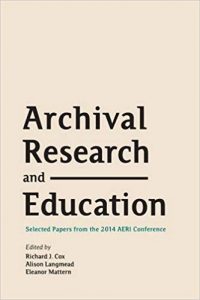Archival Research and Education
Selected Papers from the 2014 AERI Conference
Editors: Richard J. Cox, Alison Langmead, and Eleanor Mattern
Price: $60
Published: December 2015
ISBN: 978-1-63400-020-8
436 pages
Series on Archives, Archivists and Society
This book is number 7 in the Series on Archives, Archivists, and Society, Richard J. Cox, editor.
The sixth annual Archival Education and Research Institute (AERI), hosted by the University of Pittsburgh School of Information Sciences in July 2014, brought together doctoral students and faculty engaged in Archival Studies from around the world, although principally from the United States. Supported by the Institute of Museum and Library Services, these institutes are designed to strengthen education and research, as well as support academic cohort building and mentoring in the archival community.
This publication features fifteen essays by both emerging and established archival scholars and faculty from four continents. Subjects include: dictatorship archives in Brazil, affect and agency in the archives of the countries of the former Yugoslavia, archival images in recent movies, archival systems interoperability research, cross institutional usages of EAD 2002 , Ernst Posner and archival scholarship in Washington, D.C., technical infrastructures and digital heritage preservation, the challenges of safeguarding intangible cultural heritage, enabling Big Data curation in a non-archival organization, personal archiving of Web pornography, the history and future of archival education in the United States, innovative archival teaching methods in China, rights in records as a platform for participatory archiving, and archival readings of Derrida’s Archive Fever. These contributions reflect the range of new archival research, the continuing maturation of archival education, and the growing international collaboration among archival scholars and faculty.
The volume is offered in memory of Terry Cook (1947-2014), the plenary speaker at the first AERI conference in 2009.
The contents of the volume are as follows:
In Memory of Terry Cook Anne Gilliland
Introduction Richard J. Cox, Alison Langmead, and Eleanor Mattern
International Perspectives, Human Rights, and Archives
Lucian Heymann, “Dictatorship Memories and Archives in Brazil: Reflections on Politics and Projects.”
Anne Gilliland, “Studying Affect and its Relationship to the Agency of Archivists in the Countries of the Former Yugoslavia.”
Anne Gilliland and Sue McKemmish, “Rights in Records as a Platform for Participative Archiving.”
Archival Images
Lindsay Mattock and Eleanor Mattern, “Looking at Archives in Cinema: Recent Representations of Records in Motion Pictures.”
Archival Systems and Standards
Gregory Rolan, “Archival Systems Interoperability: Research Themes and Opportunities.”
Sarah Buchanan, “Cross Institutional Usage of EAD 2002 as an Archival Description Standard.”
Archival History
Jane Zhang, “Archival Scholarship in the Nation’s Capital: Ernst Posner.”
Digital Heritage and Archives
Patricia Galloway, “Technical Infrastructures and Digital Heritage Preservation.”
Tonia Sutherland, “A Culture of Collaboration: Bridging the Gap Between Archive and Repertoire.”
Lorraine Richards, Adam Townes, and Yuan Yuan Feng, “Curation through the Back Door: Enabling Big Data Curation Capabilities in a Non-Archival Organization.”
Personal Archiving
Sarah Ramdeen and Alex Poole, “’Leaving the mouse on the left is the new leaving the tape in the VCR’: Personal Archiving, Personal Information, and the ‘Pariah Industry’ of Web Pornography”
Archival Education and Knowledge
Alison Langmead, “The History of Archival Education in America: What’s Next?”
Huang Xiaoyu, “The Innovation of Archival Teaching Method: Introducing Archival News into the Classroom.”
James M. O’Toole, “Understanding Understanding: What Do Archivists Need to Know, Then and Now?”
Robert Riter, “Derridean Influences: Archival Readings of Archive Fever.”
Richard J. Cox, Alison Langmead, and Eleanor Mattern are faculty in the Archival and Information Studies program at the University of Pittsburgh School of Information Sciences.
